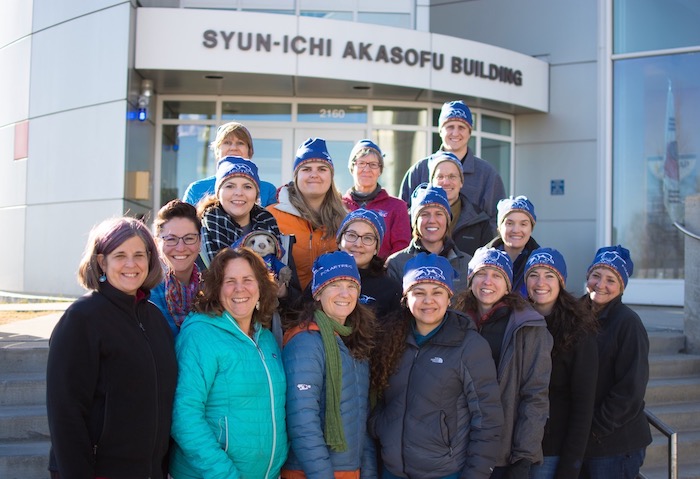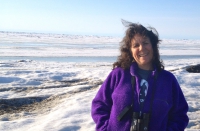By: Janet Warburton, ARCUS Project Manager
You know it's summer in the Arctic when educators start heading into the field with researchers! Beginning in June 2019, educators will be embedded as research team members in authentic scientific expeditions in the Arctic and Antarctica. They will be working in research locations from the Arctic Ocean to the South Pole in Antarctica, as part of the NSF-funded project entitled STEM at the Poles! Research Experiences for Formal and Informal Educators in the Polar Regions.
The Arctic Research Consortium of the U.S. (ARCUS) was recently awarded three years of funding from the National Science Foundation's Office of Polar Programs to support STEM at the Poles. This program utilizes ARCUS' signature education program, PolarTREC, to provide cutting-edge field research opportunities for U.S. Science, Technology, Engineering, and Mathematics (STEM) educators from both formal and informal learning environments. Through these unique research experiences, participants will connect to the polar focused research community and develop Next Generation Science Standards (NGSS) resources with the goal to change how they teach STEM in both informal and formal learning environments.

In the current program year, twelve STEM educators will spend three to six weeks working with research teams in the Arctic or Antarctic. Arctic expeditions take place during the summer, beginning in June 2019. The Antarctic field season begins in October and continues through the winter of 2019–2020. With the continuing grant award, an additional 36 educators (eighteen U.S. middle and high school teachers and eighteen U.S. informal science educators) will also have the opportunity to participate in the program.
While on field expeditions, they will be working with the researchers to share their experiences with the public through the use of the PolarTREC website, creating online journals, photo albums, videos, and online learning resources. While in the field, the participants often share their experience and science in real-time (via online video platforms) with a variety of audiences. After the field experience, the teams continue to share their experiences with the public by creating instructional activities to transfer scientific data, methodologies, and technology to classrooms and other learning settings. One of the main goals of STEM at the Poles! is to allow for greater co-creation and collaboration between educators that work in classrooms and those that work outside the classroom, with the hopes of sharing polar science to larger audiences and across a variety of learning settings. Former PolarTREC alumni also have an important role in the program as mentors to new participants.
The first expedition departs 3 June 2019 with David Walker from Austin, Texas, as he heads to Toolik Field Station in Alaska for four weeks. David will be working with Dr. Rose Cory, Dr. Byron Crump, and Dr. George Kling on an NSF-funded project: Collaborative Research: Coupled Biological and Photochemical Degradation of Dissolved Organic Carbon in the Arctic. By mid-June multiple teachers will be heading to Alaska.
Researchers who might be interested in hosting a STEM educator on a future field research project are encouraged to contact ARCUS Project Managers, Janet Warburton and Judy Fahnestock at info [at] polartrec.com or visit the PolarTREC website.
About the Author
 Janet Warburton is a Project Manager at ARCUS whose primary focus is developing and implementing education related projects that help ARCUS meet its mission. For over a decade, she has administered ARCUS' signature education program, PolarTREC - Teachers and Researchers Exploring and Collaborating. She is also currently working with The Arctic in the Classroom, a program that focuses on citizen science projects in the Arctic. She is currently ARCUS' representative for University of the Arctic. Prior to joining ARCUS, she worked and lived in the Arctic in Kotzebue, Alaska. She has worked both with the federal government and local school districts developing and revamping science education programs to be more place-based as well as focus on both natural resource management and local knowledge.
Janet Warburton is a Project Manager at ARCUS whose primary focus is developing and implementing education related projects that help ARCUS meet its mission. For over a decade, she has administered ARCUS' signature education program, PolarTREC - Teachers and Researchers Exploring and Collaborating. She is also currently working with The Arctic in the Classroom, a program that focuses on citizen science projects in the Arctic. She is currently ARCUS' representative for University of the Arctic. Prior to joining ARCUS, she worked and lived in the Arctic in Kotzebue, Alaska. She has worked both with the federal government and local school districts developing and revamping science education programs to be more place-based as well as focus on both natural resource management and local knowledge.
